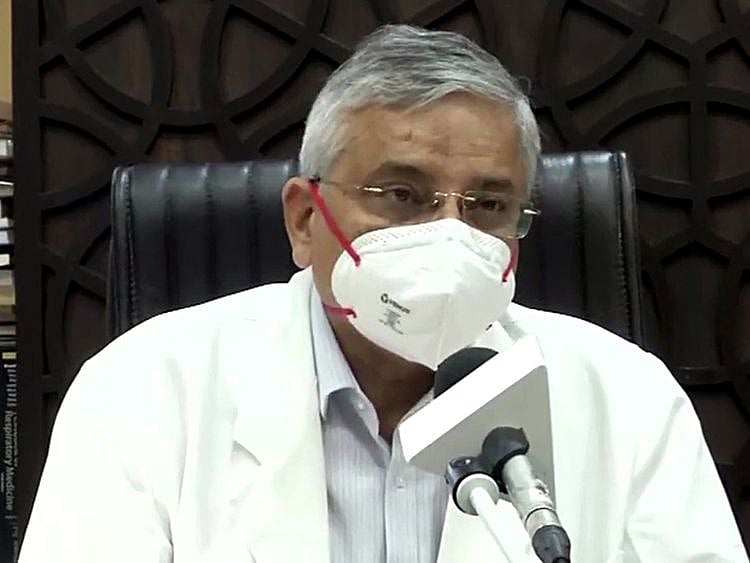COVID-19: Crucial ICMR research will prove if there’s ‘herd immunity’ in India, AIIMS chief says
Rise in cases not unusual, given the size of India’s population, AIIMS chief explains

Dubai: With India seeing a considerable spike in the number of cases of coronavirus-infected persons during the last seven days, capital New Delhi and its adjoining areas, commonly known as the National Capital Region (NCR), are fast turning out to be the new hotbed of COVID-19 in the second-most populous nation in the world. Manish Sisodia, Delhi’s Deputy Chief Minister, yesterday said the authorities expected infections to soar to 550,000 by the end of July, up from the current 30,000.
Even as the administrative machinery and the health-care infrastructure in Delhi is grappling with containment measures, a controversy has brewed over whether Delhi should reserve access to its available hospital beds for treatment of COVID-19 for patients residing in Delhi only.
Gulf News spoke to Professor Dr Randeep Guleria, director, All India Institute of Medical Sciences (AIIMS), New Delhi, on Tuesday to understand the situation on the ground. Following are excerpts from a telephonic conversation:
GULF NEWS: The number of positive cases in India has shot up significantly over the last week or so. The numbers in Delhi are particularly alarming. What could have contributed to this?
DR RANDEEP GULERIA: Actually, this spike in the number of cases isn’t unusual because we ought to always keep in mind the size of the population we are dealing with in India. With this kind of population numbers, the positive cases are bound to increase. So the numbers haven’t taken us by surprise. In fact, the containment measures have worked so far in keeping numbers under control. The real challenge is to test, identify and isolate the positive cases and that is what we have been doing for so long. The more tests we conduct, the more positive cases will come to light and we will have to make sure that our isolation and containment measures are sufficient.
Initially, when the nationwide lockdown was introduced, majority of the international flights coming in to India landed at either New Delhi or Mumbai because these are the busiest international airports in the country. Today, both these metros are the worst-affected in India. Your views …
See, the point is that though New Delhi and Mumbai handled bulk of the incoming international passengers, these cities also had precautionary measures in place. For instance, in Delhi, we had elaborate and extensive arrangements for the quarantine of passengers. People coming in to the country were under surveillance for a stipulated period of time and all necessary follow-up measures were undertaken. So I don’t think the presence of people coming in from abroad could have resulted in an escalation in the number of cases.
There was some talk of allowing access to Delhi hospitals for COVID-19 treatment only to those residing in Delhi. Do you support such an arrangement?
No I don’t favour such a move, for the simple reason that ‘Delhi’ as we know it, is not just the capital city but it also involves what is known as the National Capital Region (NCR). Now this NCR would include certain prominent townships that are on the periphery of Delhi, but technically belonging to other states, such as Noida, Faridabad, Gurugram etc. Now if we have an emergency case of a patient coming in from any of these places that are close to New Delhi, can we really refuse them admission or treatment saying that he or she isn’t a resident of Delhi? That’s not possible. For that matter, can we deny treatment to anyone who happens to come from any other part of the country? That’s not a practical way to deal with the situation. We need to treat every case on its merit and help with whatever medical assistance is necessary. As health-care professionals that’s our responsibility. We certainly cannot pick and choose our patients depending upon their residency.
But it is being alleged that Delhi doesn’t have enough hospital beds for its own residents. Is that true?
I don’t agree with that view. Our health-care system and our infrastructure is fully equipped to handle the situation. Of course there are challenges. As I have already said that the size of India’s population is a challenge, but we are equipped to deal with it.
Given the way the number of cases have risen sharply over the last seven days or so, do you think community spread has already started in India?
No there is still no trace of community spread in India. There could be some community spread within certain population clusters, particularly in the containment zones. However, there is still no conclusive evidence to suggest that there has been a community spread of the virus in India.
Do you think India could be moving towards ‘herd immunity’ in the next few months?
There is still no conclusive data to suggest that we have started developing ‘herd immunity’, but Indian Council of Medical Research (ICMR) is currently conducting a study on likely trends and the report will be out later this week. Once we have that report, we will get a clearer picture on whether ‘herd immunity’ has set in or not.
Sign up for the Daily Briefing
Get the latest news and updates straight to your inbox
Network Links
GN StoreDownload our app
© Al Nisr Publishing LLC 2026. All rights reserved.